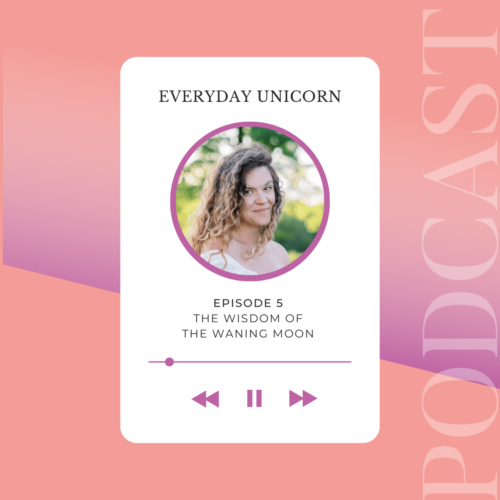You know that feeling when you think about writing (for your blog, newsletter, Instagram channel, or basically anyplace your audience hangs out) and your brain screeches to a halt?
The lights go out. The walls go up. The dream of prolific, playful sharing vanishes like a puff of smoke.
I know. It sucks. And it happens to everyone: my clients, my readers, my boss lady colleagues, and, of course, Yours Truly.
That’s right: After 20 years of writing practice, I still feel blocked sometimes. Fortunately, I know writer’s block is a myth—so I don’t buy into the false belief that I have a permanent problem. All I need to do to get ideas flowing is one of a few simple shifts.
If writing content is part of your marketing strategy, business offerings, or plan for becoming the person you most want to be, ‘writer’s block’ isn’t going to cut it.
In my last blog post, I explained why I believe writer’s block is a myth. (Missed it? Click here to catch up.)
Today, I’m going to share one REAL reason we “go blank” and what you can do about them.
After years of helping clients write and navigating my own writing practice, I’ve noticed three common issues that masquerade as writer’s block.
Today we’ll explore the REAL reasons why your brain goes blank—and what you can do about it.
Reason #1: You don’t care enough.
Much of the time, business owners think about writing as another chore on their to-do list. They’re not wrong, necessarily, since it does require effort, focus, and consistent attention, but framing the work as a hard, slogging chore is dooming yourself for failure.
Let’s say you’re a graphic designer, and you need to write a newsletter. You think, ‘Hmm, I should probably write about photo sizing because it’s a question my clients ask a lot.’ But when you sit down, your brain goes blank because BOOM, you don’t give a sh*t. It makes sense, right? If you would never, ever talk about photo sizing in a real life conversation, if you’d rather sweep dead spiders off your porch, then your brain will launch a protest when you sit down to write about that topic (photo sizing, not spiders, obvs). Don’t get so wrapped up in being a helper that you squash your authentic voice.
Fortunately, the solution is simple: Tell the truth and care.
Pick a topic you DO give a sh*t about and choose to talk about it. Worried it won’t be relevant for your audience? Think about how and why your ideal client might care about it too. Does the subject relate to an experience they’ve had? Does it impact an area of life where they struggle? Can it provide a handy metaphor for living the kind of life they dream about?
I’m a fan of creating content that will serve your audience somehow. (The easiest way I find to do this is sit down and ask yourself, “How can I serve this person right now? What do I want him or her to know, think, or feel?”) That being said, people do want to know the person behind your brand and business, so feel free to stand on your soapbox and share stuff because you think it matters.
Anytime you choose to “write from the heat”, you light a fire among your perfect-fit people. Your audience is like you; they vibe with your vibes. If you want to write in a way that moves people, you need to write about what moves you.
So really, it’s helpful your brain shuts down when you try to write stuff you hate—because if you phone it in or resent the process, your readers are going to feel that.
If choosing to write what you love doesn’t quite get the words flowing, you might be grappling with another block…
Reason #2: You care too much.
In your gut, you already know the topics you love to talk about. If you can’t recite them off the top of your head, no worries—just take a minute to pause, reflect, and ask what matters to you right now.
However, your brain may refuse to slow down and hear what’s in your heart. It spins into panic at the thought of sharing what’s true or outside your typical box.
As humans, we have internal programming that scares us away from exposing ourselves to the tribe. We fear rejection, abandonment, and the loss of social safety on a deep and primal level.
That’s why we feel vulnerable speaking up, sharing our beliefs and strongly-worded opinions. We’re afraid of the consequences of being different.
When you consider taking a stand for something without proof other people will like it, it’s natural to start negative forecasting.
Bogged down by fear, your brain tries to control the outcome—with perfectionism, procrastination, or just going blank.
What if someone disagrees with you? What if you sound silly? What if you ruin your reputation or actually repel one of your readers?
On the flip side, what if no one cares? What if it’s irrelevant or been done before?
Or what if you say one great thing today and you’re out of ideas tomorrow?
So it goes, on and on, a cacophony of catastrophe. Your brain’s spinning stories as covers for fear.
Recognize these stories as a subconscious effort to cling to your comfort zone. You’re trying to control an unpredictable outcome —thereby doing nothing at all.
The truth is, you cannot guarantee that anything you write will keep you safe, earn you praise, or convert casual readers into raving fans.
Once you hit publish, the work will be out of your hands—and yes, that can be scary. But you can talk yourself down off the ledge and start making strides forward in life.
After all, everything you want is on the far side of your comfort zone.
The solution in this case requires you to release your grasp on the outcome.
You need to make peace with whatever happens once you share your ideas with the world.
Try this 5-step process for letting go:
- Take a deep breath and exhale slowly. Drop into your heart.
- Acknowledge that you are pre-judging your ideas. You’re likely a much harsher critic than anyone else.
- Remember that you (plus your business, your reputation, your heart) are way more resilient than you are giving yourself credit for. What’s the worst thing that will happen if you share what you believe? Avoid catastrophizing but be honest, then decide if you truly believe you can survive it.
- Reflect on why you want to write something in the first place. If you’re using content to grow your business, why does growing your business matter to you? If you’re doing it for creative self-expression, why do you need to speak your truth?
- Take one more deep breath—then do the thing. Say what you really want to say and write what you really want to write.
Once you’ve taken some time to work through this process, you should find true ideas stirring in your mind.
If, however, you’re still feeling blank, you might start to wonder how much head-pounding you need to break through this particular block.
When no amount of pushing to get the words out makes an ounce of difference, your issue might be the exact opposite of what you think.
Reason #3 you’re out of ideas: You’re pushing yourself too hard.
The creative process often gets compared to giving birth to a child. Having never done the latter, I can’t comment on the accuracy of the analogy—but I do know creation is a messy, cyclical process that requires both effort and relaxation.
If you’re pushing and pushing but failing to ‘give birth’, you might need to take a break.
To put it another way, if it feels like you’re trying to pour from an empty cup, chances are your cup is empty.
Sounds pretty obvious, right? Yet all of us can get obsessed with the notion that we need to DO MORE RIGHT NOW OMG. More sharing, more showing, more serving, more telling, all without taking a beat.
Productivity rocks, but don’t get it twisted. Creative insights can only alight if you give them space to land.
If you’re always stuck in production mode, you wind up stifling yourself. You deny yourself the fuel you need to authentically re-imagine the world.
As you may know, most great writers are voracious readers. The habit not only strengthens their ears and understanding of language and structure, it gives them fodder for inspiration. They know it’s important to rest and refuel their hardworking brains. To enjoy mindful consumption as well as creation.
So maybe your issue isn’t writer’s block. Maybe you just need to fill up your cup, and you haven’t acknowledged it yet.
In this case, the solution is simple (and it feels so, so good):
Stop pushing for communication and commune with your life instead.
It’s time to slow down, turn away from the screen, and enjoy the life all around you.
Try it now.
Take 60 seconds to notice, to really observe, your physical reality. Absorb the moment and let it wash over you like a wave of calm.
There’s nowhere to go.
There’s nothing to chase.
There’s no more you need to be.
You are enough.
Now is enough.
This single moment is enough.
As you absorb it, let yourself feel whatever is true for you.
Laugh if you feel like it.
Cry if you feel like it.
Feel your aliveness, whatever it is, right here in this moment.
Allow yourself to commune with the life that is magnificently, wonderfully, immediately yours. You are ALIVE—and what does that feel like? Could you describe this wild, amazing experience to someone outside your skin?
Every day, we move through a series of small miracles: a breath, a touch, a thought, a sound, a beat of blood under skin. Whether you slow down to see them or rush ahead while they pile up like to-do items on your list, they are always here for you.
When you stop pushing and choose to slow down, you create enough quiet to hear your authentic voice. Inspired ideas emerge because you can finally hear them.
Secretly, this is my favorite technique for generating content ideas. Because your authentic voice, the still knowing inside your heart, is your constant companion and connection to the Truth.
If you’re making the time to write or speak or share ideas with your perfect-fit people, you owe it to them (and to yourself) to communicate the stuff that matters most.
Only you know what lives your heart and what you want to share. If you find yourself doubting the clarity of your connection, take a step back, exit your head, and commune with something deeper.
So there you have it: three secret reasons you’re getting stuck and what to do about them.
Now I’d love to hear from you. What’s your next creative project (in writing, business, or life), and what (if anything) is getting in your way?
Let me know in the comments.
Until then, happy writing!



